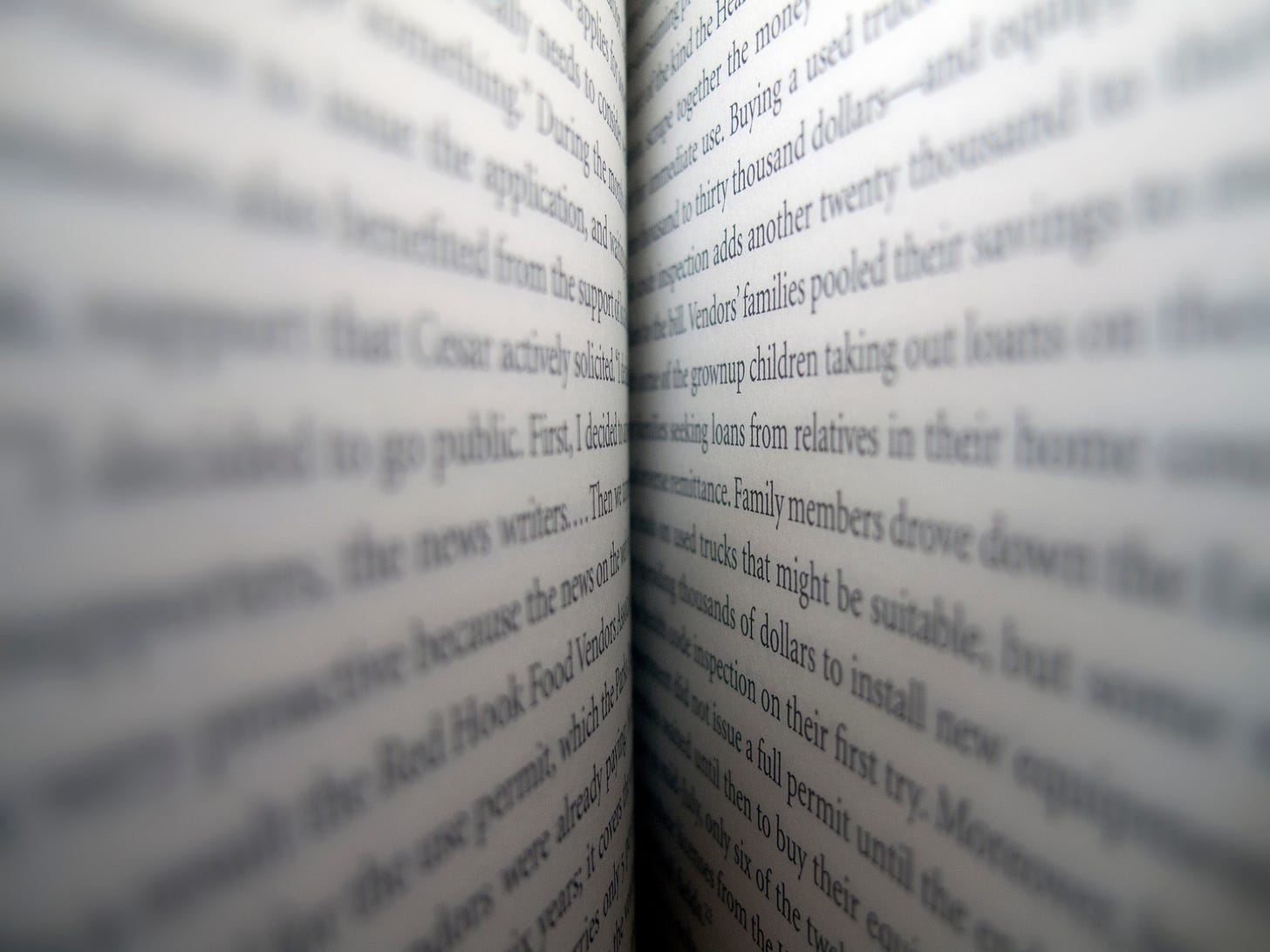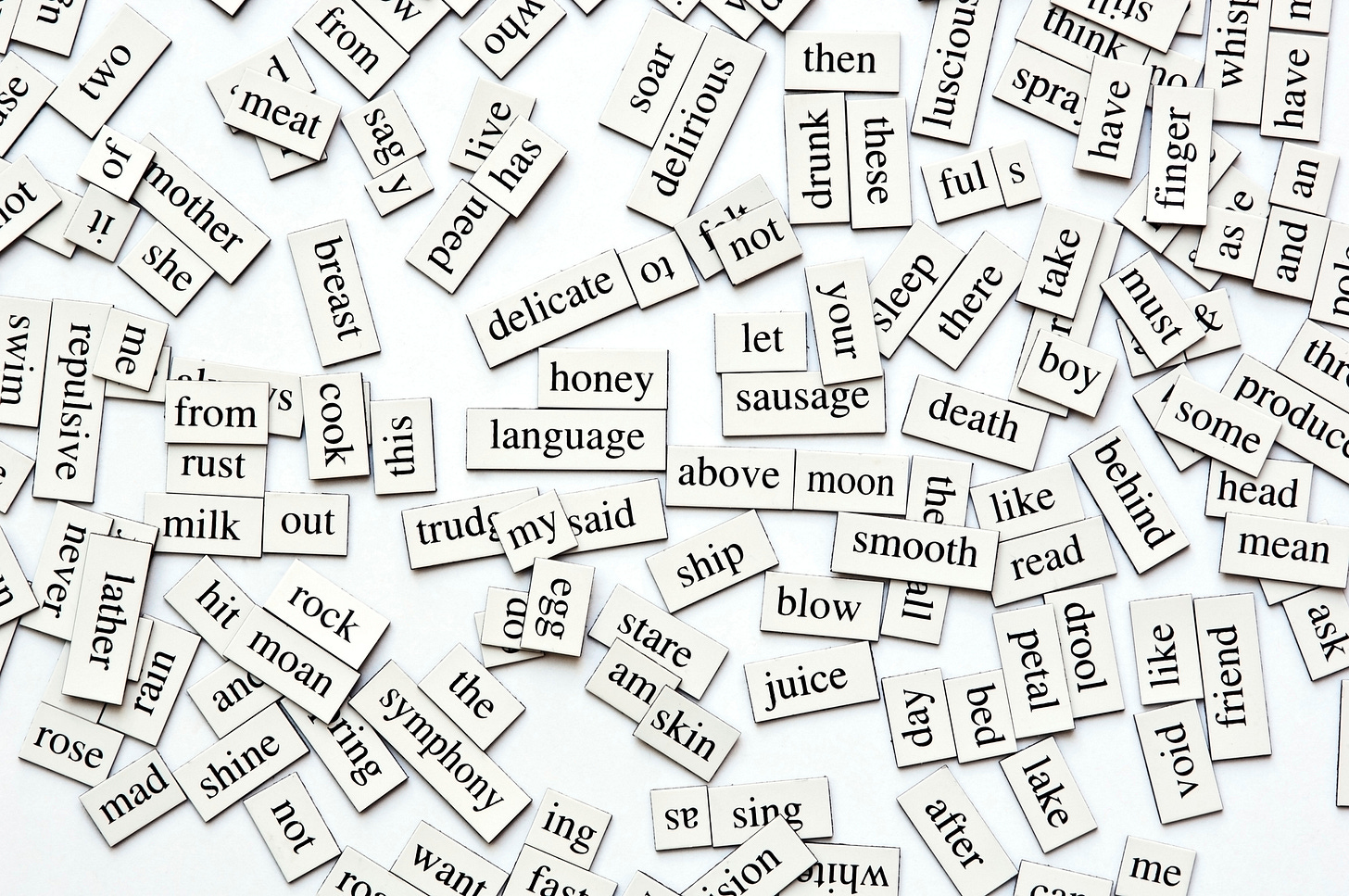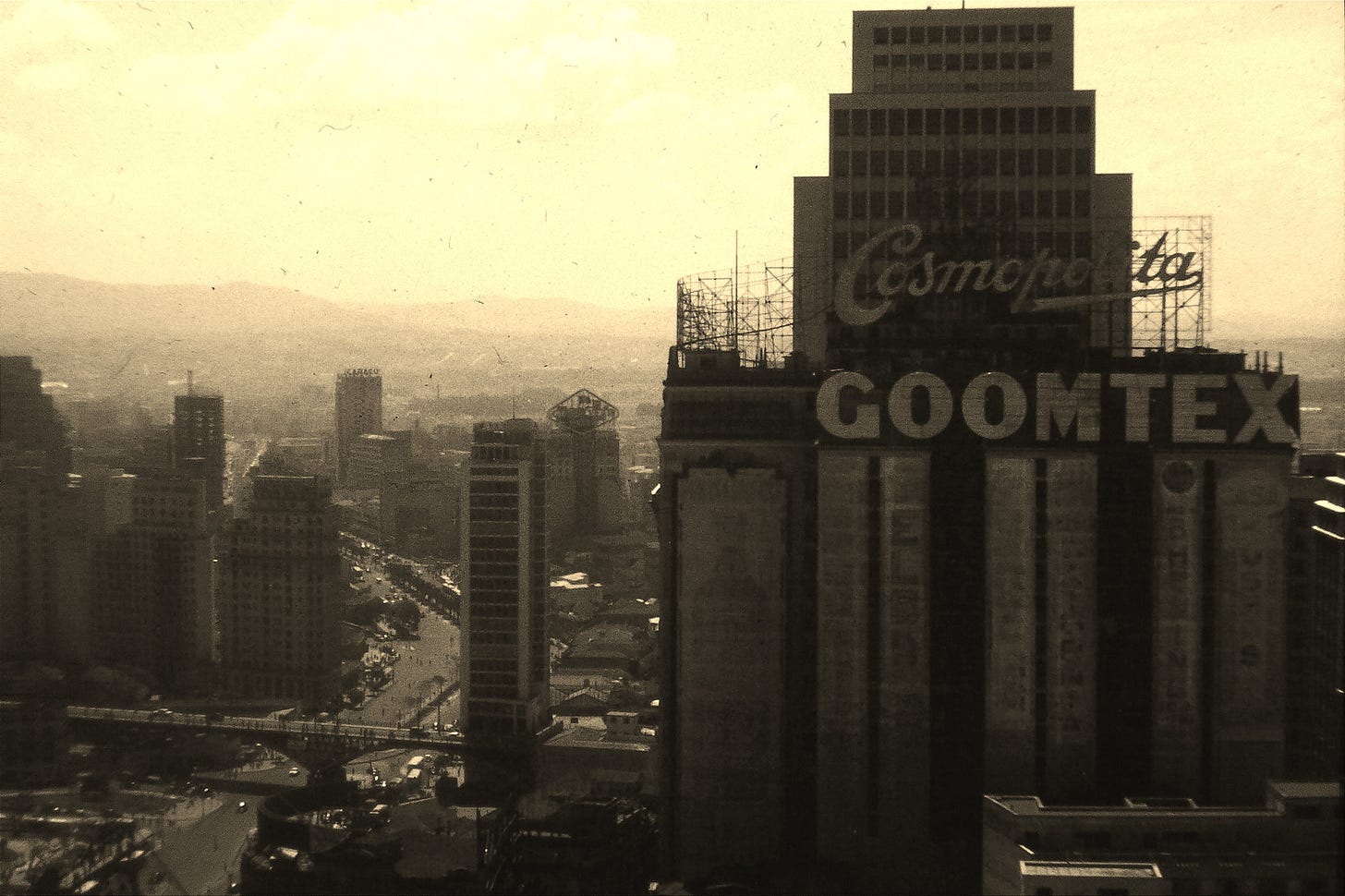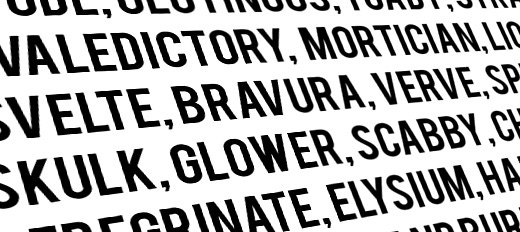Words of Note
And a whole bunch of footnotes
One of my favourite words is APOCOPE1. . . I love its sound, its explosiveness (as do some of my Tourettic friends—for whom it becomes a 4-syllable verbal tic which can be impacted or imploded into a tenth of a second) and the fact that it compresses 4 vowels and 4 syllables into a mere 7 letters. I also like SYZYGY2 (for some of the same reasons and because it has 3 distinct meanings).
Oliver Sacks
Letter to Lewis Frumkes
20th February 1997
—Oliver Sacks: Letters
How I hate the word ‘chic’. C’est plus chic, moins chic, pas chic, très chic. French women haven’t another note to sing on.
Katharine Mansfield
Letter to Ida Constance Baker
4th June 1922
—Collected Letters of Katharine Mansfield, Vol.1
The greatest single word I know is ‘drome’ which, for some reason, nearly opens the doors of heaven for me. Say it yourself, out aloud, and see if you hear the golden gates swing backward as the last, long sound of the ‘m’ fades away. ‘Drome’, ‘bone’, ‘dome’, ‘doom’, ‘province’, ‘dwell’, ‘prove’, ‘dolomite’—these are only a few of my favourite words, which are insufferably beautiful to me. The first four words are visionary. God moves in a long ‘o’.
Dylan Thomas
Letter to Pamela Johnson
December 1933
—Selected Letters of Dylan Thomas
Why is everything going bad at once? The world’s evil boiling over—Neil’s head obviously unsorted-out, your back going, Barbara’s cancer, Barry’s diabetes—it’s as though one thing is bringing down another—tipple-topple, a sort of general degringolation3. I love that word—it doesn’t exist in English but it ought to.
Diana Athill
Letter to Edward Field
27th September 2001
—Instead of a Book: Letters to a Friend
I’ve bought a few things very cheap. But most of the things were too horrible, ‘gimcrack’4 to use my father’s favourite word.
Dora Carrington
Letter to Gerald Brenan
23rd March 1924
—Carrington: Letters and Extracts from her Diaries
Oh, you amazing, painfully sweet, painfully tangy creature! Sehnsucht!5 You don’t know how I love the word. It is my favorite word, my holy word, my magic formula, my key to the mystery of the world.
Thomas Mann
Letter to Katia Mann
September 1904
—Letters of Thomas Mann, 1889-1955
I’m unhappy about the word “cunt” and your use of it. It’s an ugly word and could only be used in an ugly sense. Whoever invented it, invented it as an ugliness, an insult. Listen to it! What could it have to do with the genitals you know. The word begins with a “c” that cuts like a blunt knife, goes on to a “U” which is a shit grunt, or bestial grunt, and ends in “nt” like a brick wall. The word is short, hard and brutal, could never relate to depth, tenderness, the gentle flower-like qualities, the passionate energy of inner muscle, the organ capable of speaking the language of life force. There is, it seems, no adequate word. Vagina is somehow wrong. The “v,” the hard “g,” the shrill “i” just doesn’t quite make it. “Pussy” is condescending, despite your respect for and long loving relationship with Kitch. Cunt is a proper word for taxicab drivers who won’t stop and all sorts of other human horrors. The one thing it ought never be used to indicate is our bodies. That meaning ought to be driven out of the language.
Carolee Schneemann
Letter to Marilyn Wright
26th August 1975
—Correspondence Course: An Epistolary History of Carolee Schneemann and Her Circle
I hate the word [“flippancy”]. I hate to be put in the position of using such words as “respect” and “flippancy,” which have so often enraged me, but there is some meaning in them.
Maxwell Perkins
Letter to F. Scott Fitzgerald
12th December 1921
—Editor to Author: The Letters of Maxwell E. Perkins
I never knew until you told me that you had written the “blurb” (I love that word like a hot baked stuffed potato full of butter).
Katherine Anne Porter
Letter to Matthew Josephson
7th January 1931
—Letters of Katherine Anne Porter
I’m spending this week at home, festooned between (that’s not quite the word, I mean pinned up between, like a line of washing) Easter & a ghastly ‘party’ (how I hate that word, as much as some people love it).
Philip Larkin
Letter to Judy Egerton
19th April 1968
—Selected Letters of Philip Larkin
I simply can’t write letters. I have made a name for the disease from which I suffer: I have named it EPISTOPHOBIA. I haven’t written a letter all winter. I wish it were socially impossible to write a letter. I wish there were no post-office, no stamps, no facilities whatever for expediting the smug, intrusive, tedious letters that people write.
Edna St. Vincent Millay
Letter to Witter Bynner
2nd May 1935
—Into the World’s Great Heart: Selected Letters of Edna St. Vincent Millay
The meaningless word of all time is “nice” as in “he’s a nice guy”. It seems that’s all we presently ask of our fellow man—that he be a “nice guy” whatever the hell that is.
Elia Kazan
Letter to his daughter, Judy
7th December 1954
—The Selected Letters of Elia Kazan
This wonderful word [“GOOMTEX”] (meaning unknown to me6) is lit up at night, of course—in fact I’ve never seen so many electric signs in my life. A Japanese firm makes them & they are the biggest & best in the world, I believe—& weirdest.
Elizabeth Bishop
Postcard to Robert Lowell
24th September 1959
—Words in Air: The Complete Correspondence between Elizabeth Bishop and Robert Lowell
Do you not dislike intensely the word ‘wistful’? I do. At least, I have never thought about it before, but having written it twice on this page, I now loathe it with a great loathing.
The Queen Mother
Letter to D’Arcy Osborne
11th March 1930
—Counting One’s Blessings: The Selected Letters of Queen Elizabeth the Queen Mother
As Cousin Menella cannot tell you the meaning of “kakography,” I must do my best: the word now means “bad or incorrect writing,” but its original meaning was “vulgarity,” and it is thus derived: “kay” or “kai,” a Syriac verb, signifying “to wear”: “kog” or “kogh” in Chaldee means “paper”: and “graph” or “graf,” is a Hebrew word meaning “flowers.” Hence “kakography” meant “the wearing of paper flowers,” and from this came to mean “vulgarity,” as the wearing such flowers has always been considered among civilised nations as the height of vulgarity. In the same way “kakographist,” meant originally, “she that wears paper flowers,” and was a term of great reproach: its meaning is now altogether changed.
Lewis Carroll
Letter to his sister, Mary
6th March 1851
—The Selected Letters of Lewis Carroll
What a flat-sounding word [“friendship”] is for what becomes, later on in life, the most important element of it! To me the French word for this deep relationship, probably all the deeper because it exists outside and beyond the physical kind of devotion, is much more appealing. It covers a broader spectrum and surely its depth is greater. The word is l’amitié.
That which we call and think of as “love” is often a promiscuous word in more senses than one. In all but the rarest cases in my experience I am afraid that it has depleted more than replenished the reservoir of my emotions, and in quite a number of cases it has also polluted and debased—and never mind if I come on as what I am, a man who is still a child in the shadow of a Protestant rectory.
Tennessee Williams
Letter to Maria Britneva
22nd June 1976
—The Book of Love: Writers and Their Love Letters
I LIKE WORDS
In 1934, a New York copywriter by the name of Robert Pirosh quit his well-paid job and headed for Hollywood, determined to begin the career of his dreams as a screenwriter. When he arrived, he gathered the names and addresses of as many directors, producers and studio executives as he could find, and sent them what is surely one of the greatest, most effective cover letters ever to be written; a letter which secured him three interviews, one of which led to his job as a junior writer at MGM. Fifteen years later, screenwriter Robert Pirosh won an Academy Award for Best Original Screenplay for his work on the war film, Battleground. A few months after that, he also won a Golden Globe.
Dear Sir:
I like words. I like fat buttery words, such as ooze, turpitude7, glutinous8, toady9. I like solemn, angular, creaky words, such as straitlaced, cantankerous, pecunious10, valedictory11. I like spurious12, black-is-white words, such as mortician, liquidate, tonsorial13, demi-monde14. I like suave “V” words, such as Svengali, svelte, bravura, verve. I like crunchy, brittle, crackly words, such as splinter, grapple, jostle, crusty. I like sullen, crabbed, scowling words, such as skulk, glower, scabby, churl15. I like Oh-Heavens, my-gracious, land’s-sake words, such as tricksy, tucker, genteel, horrid. I like elegant, flowery words, such as estivate16, peregrinate17, elysium18, halcyon19. I like wormy, squirmy, mealy words, such as crawl, blubber, squeal, drip. I like sniggly, chuckling words, such as cowlick, gurgle, bubble and burp.
I like the word screenwriter better than copywriter, so I decided to quit my job in a New York advertising agency and try my luck in Hollywood, but before taking the plunge I went to Europe for a year of study, contemplation and horsing around.
I have just returned and I still like words.
May I have a few with you?
Robert Pirosh
This one-man newsletter takes a lot of time to research and produce and footnote. If you’re able and keen to support it, here’s how:
Thank you.
The first four photos above are from Getty. The last image is from the Letters of Note book, in which the Pirosh letter can be found. Signed copies can be bought directly from me, here.
Apocope is the linguistic term for the loss or omission of one or more sounds or syllables from the end of a word.
Syzygy is a term used in astronomy to describe the alignment of three celestial bodies—such as the Sun, Earth, and Moon—in a straight or nearly straight line. The word is also used metaphorically in literature, philosophy, and mysticism to signify a union or pairing of opposites. Linguistically, it refers to a specific type of metrical pattern in poetry.
Dégringolade is a French noun meaning a rapid decline, downfall, or collapse.
Gimcrack, as a noun, refers to a cheap, showy, and poorly made object—something that looks fancy but is actually flimsy or worthless. It can also be used as an adjective to describe something gaudy and insubstantial.
The German word Sehnsucht loosely translates to “longing” or “yearning” but carries a much deeper, almost untranslatable sense of wistful desire for something unattainable.
Goomtext was in fact the name of a Brazilian raincoat brand founded by David Zeiger.
Turpitude refers to moral corruption or depravity.
Glutinous describes something sticky, gooey, or glue-like in texture.
A toady person is someone who behaves in an obsequious manner to gain favour, often through excessive flattery.
Pecunious is an uncommon word meaning wealthy or having a lot of money.
Valedictory: serving as a farewell or goodbye.
Spurious means false or not genuine, often used to describe claims or arguments.
Tonsorial relates to barbers or hairdressing.
Demi-monde is a French term describing a group of people on the fringes of respectable society, often linked to scandal or vice.
A churl is a rude, boorish, or miserly person.
Estivate is a biological term meaning to spend the summer in a dormant or inactive state, similar to hibernation.
Peregrinate: to travel or wander from place to place, often in a leisurely or purposeful manner.
Elysium originates from Greek mythology and refers to a place or state of perfect happiness.
Halcyon describes a time of peace, calm, or prosperity.








I love talking about words. If I weren’t an English professor, I’d be a vulcanologist just for the sound of it.
Personally, I like the word "Thwart." It sounds just like a fart in the bathtub.
The worst of words is "fondly." It has all the profundity of Pablum.